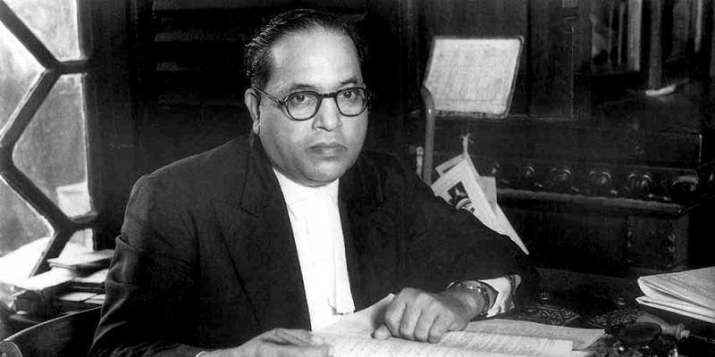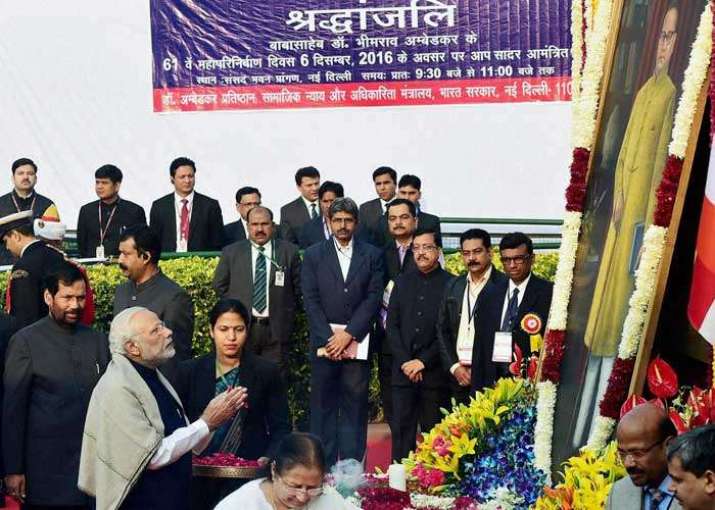NEWS
Anniversary of B. R. Ambedkar's Death Prompts Marches and Reflection
 Dr. Ambedkar. From yourstory.com
Dr. Ambedkar. From yourstory.comLast Thursday, 6 December, marked the anniversary of the passing of India’s Dalit constitutional father, Dr. B. R. Ambedkar (1891–1956). The event is also known as Ambedkar Nirwan Diwas. Tributes abounded across India’s political, literary, and media establishments, including a tweet from Indian PM and BJP leader Narendra Modi’s official Twitter account stating, “India bows to Dr. Babasaheb on Mahaparinirvan Diwas.” The tweet showcased a 1:45 minute-long video of Modi bowing and praying before images of the constitutional lawyer and religious leader, and visiting sites associated with Ambedkar’s life. Rahul Gandhi, an MP and prominent member of the Nehru-Gandhi family, tweeted a photo of him kissing the hand of an Ambedkar statue. Both men, along with the president of India and other political figures, paid tribute to Dr. Ambedkar on the Parliament House Lawns, in New Delhi.
On the same day, thousands of Dalits marched to Chaityabhoomi in Mumbai, where Dr. Ambedkar’s last writes were performed. Hundreds more marched to the Indu Mill compound in Mumbai’s Dadar suburb, where Ambedkar’s grandsons and supporters have been contesting a government plan to reduce the height of a proposed statue of Ambedkar from 350 meters to 250 meters. The “statue of equality” has been planned since 2008, and in October 2015, Modi visited the compound and performed bhoomi puja there, a traditional Hindu ritual to bless a construction site.
Dr. Ambedkar, one of the intellectual and legal experts of the then-newly independent India, converted to Buddhism along with 500,000 fellow Dalits on 14 October 1956. He died just a few months later, due to diabetes, but left behind a tradition of Dalit mass conversions to Buddhism as both a political statement against their socially marginalized position in modern Indian society and a spiritual protest against the religious tradition and worldview of caste that legitimizes such a marginalized position. While widely recognized as the pioneer of Dalit Buddhism, Dr. Ambedkar did not live to see his movement grow.
 Modi pays tribute to Dr. Ambedkar. From rstv.nic.in
Modi pays tribute to Dr. Ambedkar. From rstv.nic.inThe Dalit Buddhist movement stagnated in the 1960s and 70s, confined to Maharashtra, parts of Uttar Pradesh, and Tamil Nadu. It was in the 1980s that the Dalit movement experienced a revival, with the help of Kanshi Ram and the former PM of India, V. P. Singh. The latter played no small part in assisting this renewal by posthumously awarding the Dr. Ambedkar with the Bharat Ratna, India’s highest civilian honor.
As Aprameya Rao noted in an op-ed: “For a man who fought all his life against upper caste domination, the BJP, traditionally a party representing the interests of upper caste Hindus, doesn’t miss a single opportunity to honor Ambedkar. One may wonder what Ambedkar would think if he were to be alive today. While political appropriation of Ambedkar continues, a new movement seems to be rising across India. This one is being led by younger voices, many of whom are products of the post-reform era.” (firstpost.com) At present, the Dalit cause has been taken up by a younger generation active on social media and familiar with the discourse and action of protest. Many of these young people are more educated than previous generations, studying in universities across India, and are more likely to be politically active and skeptical of the government’s overtures, which they see as promoting a Hindutva agenda.
See more
Narendra Modi pays tribute to Dr. Ambedkar, 6 December 2018 (Twitter)
Rahul Gandhi pays tribute to Dr. Ambedkar, 6 December 2018 (Twitter)
BR Ambedkar's 62nd Death Anniversary: For the Dalit leader, accepting Buddhism was rediscovering his roots (firstpost.com)
Demand for Dr Ambedkar’s Statue of Equality intensifies (mumbaimirror.indiatimes.com)
Related news from Buddhistdoor Global
Conference in Nagpur Explores Ambedkarite Buddhism and Chinese Buddhist Diplomacy
India’s PM Modi Inaugurates Dr. Ambedkar National Memorial in New Delhi
Buddhist Monk Who Conducted “Babasaheb” Ambedkar’s Refuge Ceremony to be Cremated on 17 December
Related features from Buddhistdoor Global
Living Dr. Ambedkar’s Vision
Buddhistdoor View: The Complexities of Buddhist Conversion and the Indian Dalit Movement














